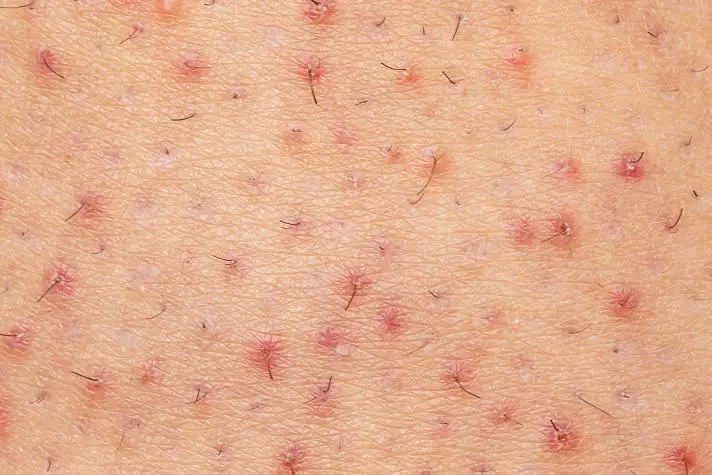What is Folliculitis?
Folliculitis is a skin condition characterized by inflammation of one or more hair follicles. It typically presents as red pimple-like bumps around hair follicles and can be caused by various factors including bacteria, fungus, and irritation from shaving or clothing. Folliculitis can be mild or severe, and in some cases, can lead to scarring or permanent hair loss. Treatment depends on the underlying cause and can include topical or oral antibiotics, antifungal medications, or medicated creams.

What are the causes of Folliculitis?
Folliculitis can be caused by a variety of factors, including:
- Bacteria: Staphylococcus aureus is a common cause of bacterial folliculitis.
- Fungi: Pityrosporum ovale is a yeast that can cause folliculitis.
- Irritation: Shaving, tight clothing, and friction from skin-to-skin contact can irritate hair follicles and cause folliculitis.
- Skin conditions: Acne, dermatitis, and other skin conditions can increase the risk of developing folliculitis.
- Medical procedures: Procedures such as laser hair removal and electrolysis can cause folliculitis.
- Immune system problems: People with weakened immune systems, such as those with HIV or undergoing chemotherapy, are more susceptible to developing folliculitis.
- Hot tubs: Prolonged exposure to hot tubs and pools with contaminated water can cause pseudomonas folliculitis.
It’s important to identify and treat the underlying cause of folliculitis to prevent recurring infections and reduce the risk of complications.
What are the symptoms of Folliculitis?
The symptoms of folliculitis can include:
-
Pimple-like bumps: The bumps are usually red and may be filled with pus.
-
Itching and tenderness: The affected area may be itchy and tender to the touch.
-
Scaling: The skin around the bumps may appear scaly.
-
Pain: In severe cases, the bumps may be painful.
-
Drainage: The bumps may produce a yellow or white fluid.
-
Scarring: If left untreated, folliculitis can cause scarring and permanent hair loss.
If you suspect you have folliculitis, it’s important to see a dermatologist or healthcare provider to receive an accurate diagnosis and appropriate treatment. The symptoms can be similar to other skin conditions, such as acne or boils, so an accurate diagnosis is important to ensure effective treatment.
What treatments are available for Folliculitis?
Treatment options for folliculitis include:
- Topical Antibiotics: Over-the-counter or prescription creams, ointments, or gels that contain antibiotics such as mupirocin or clindamycin.
- Oral Antibiotics: Antibiotics taken orally such as doxycycline, minocycline, or erythromycin for severe or recurrent folliculitis.
- Antiseptics: Over-the-counter or prescription topical agents such as benzoyl peroxide or chlorhexidine that help to reduce bacterial growth.
- Topical or Oral Corticosteroids: To reduce itching and inflammation in case of an infected folliculitis.
- Hot Compresses: Applying a warm compress to the affected area can help to reduce inflammation and speed up healing.
It’s important to note that the choice of treatment depends on the severity and cause of the folliculitis and that a doctor should be consulted for proper diagnosis and treatment.

FAQ About Folliculitis
Is folliculitis contagious?
Folliculitis can be contagious, but the risk of transmission depends on the underlying cause of the infection.
How is folliculitis diagnosed?
Folliculitis is diagnosed through a physical examination and may require a skin culture to identify the underlying cause of the infection.
Is folliculitis curable?
Folliculitis can be treated and cured, but the underlying cause of the infection may need to be addressed to prevent recurrence.
Can folliculitis leave scars?
Folliculitis can leave scars if the infection is severe or if it is not treated properly.
What measures can be taken to prevent folliculitis?
Preventive measures for folliculitis include good hygiene, shaving carefully, avoiding hot tubs and pools, avoiding tight clothing, treating underlying skin conditions, avoiding sharing personal items, and maintaining a healthy immune system.
When should I see a doctor for folliculitis?
You should see a doctor if you experience symptoms of folliculitis, if the infection is severe, or if it does not respond to over-the-counter treatments.
Is there a dermatologist near me in Sacramento that offers treatment for folliculitis?
Yes. At our Sacramento dermatology office we offer treatment for folliculits to patients from Sacramento and the surrounding area. Contact our office today to schedule an appointment.

